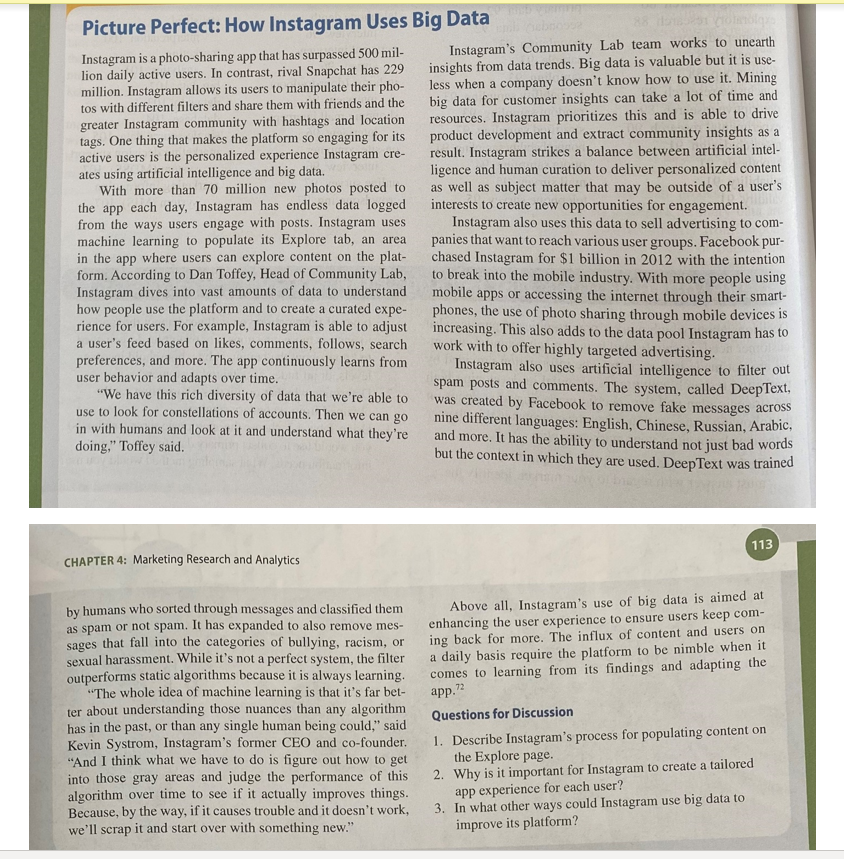a. Describe Instagram’s process for populating content on the Explore page. b. Why is it important for Instagram to create tailored app experience for each user? c. In what other ways could Instagram use big data to improve its platform?
a. Describe Instagram’s process for populating content on the Explore page. b. Why is it important for Instagram to create tailored app experience for each user? c. In what other ways could Instagram use big data to improve its platform?
Chapter5: Marketing Research And Information Systems
Section5.1: Picture Perfect: How Instagram Uses Big Data
Problem 3VC
Related questions
Question
a. Describe Instagram’s process for populating content on the Explore page.
b. Why is it important for Instagram to create tailored app experience for each user?
c. In what other ways could Instagram use big data to improve its platform?

Transcribed Image Text:Picture Perfect: How Instagram Uses Big Data
Instagram is a photo-sharing app that has surpassed 500 mil-
lion daily active users. In contrast, rival Snapchat has 229
million. Instagram allows its users to manipulate their pho-
tos with different filters and share them with friends and the
greater Instagram community with hashtags and location.
tags. One thing that makes the platform so engaging for its
active users is the personalized experience Instagram cre-
ates using artificial intelligence and big data.
With more than 70 million new photos posted to
the app each day, Instagram has endless data logged
from the ways users engage with posts. Instagram uses
machine learning to populate its Explore tab, an area
in the app where users can explore content on the plat-
form. According to Dan Toffey, Head of Community Lab,
Instagram dives into vast amounts of data to understand.
how people use the platform and to create a curated expe-
rience for users. For example, Instagram is able to adjust
a user's feed based on likes, comments, follows, search
preferences, and more. The app continuously learns from
user behavior and adapts over time.
"We have this rich diversity of data that we're able to
use to look for constellations of accounts. Then we can go
in with humans and look at it and understand what they're
doing," Toffey said.
CHAPTER 4: Marketing Research and Analytics
by humans who sorted through messages and classified them
as spam or not spam. It has expanded to also remove mes-
sages that fall into the categories of bullying, racism, or
sexual harassment. While it's not a perfect system, the filter
outperforms static algorithms because it is always learning.
"The whole idea of machine learning is that it's far bet-
ter about understanding those nuances than any algorithm
has in the past, or than any single human being could," said
Kevin Systrom, Instagram's former CEO and co-founder.
"And I think what we have to do is figure out how to get
into those gray areas and judge the performance of this
algorithm over time to see if it actually improves things.
Because, by the way, if it causes trouble and it doesn't work,
we'll scrap it and start over with something new."
88
Instagram's Community Lab team works to unearth
insights from data trends. Big data is valuable but it is use-
less when a company doesn't know how to use it. Mining
big data for customer insights can take a lot of time and
resources. Instagram prioritizes this and is able to drive
product development and extract community insights as a
result. Instagram strikes a balance between artificial intel-
ligence and human curation to deliver personalized content
as well as subject matter that may be outside of a user's
interests to create new opportunities for engagement.
Instagram also uses this data to sell advertising to com-
panies that want to reach various user groups. Facebook pur-
chased Instagram for $1 billion in 2012 with the intention
to break into the mobile industry. With more people using
mobile apps or accessing the internet through their smart-
phones, the use of photo sharing through mobile devices is
increasing. This also adds to the data pool Instagram has to
work with to offer highly targeted advertising.
Instagram also uses artificial intelligence to filter out
spam posts and comments. The system, called DeepText,
was created by Facebook to remove fake messages across
nine different languages: English, Chinese, Russian, Arabic,
and more. It has the ability to understand not just bad words
but the context in which they are used. DeepText was trained
113
Above all, Instagram's use of big data is aimed at
enhancing the user experience to ensure users keep com-
ing back for more. The influx of content and users on
a daily basis require the platform to be nimble when it
comes to learning from its findings and adapting the
app,72
Questions for Discussion
1. Describe Instagram's process for populating content on
the Explore page.
2. Why is it important for Instagram to create a tailored
app experience for each user?
3. In what other ways could Instagram use big data to
improve its platform?
Expert Solution
This question has been solved!
Explore an expertly crafted, step-by-step solution for a thorough understanding of key concepts.
This is a popular solution!
Step 1: Introduction
VIEWStep 2: a. Describe Instagram’s process for populating content on the Explore page.
VIEWStep 3: b. Why is it important for Instagram to create tailored app experience for each user?
VIEWStep 4: c. In what other ways could Instagram use big data to improve its platform?
VIEWSolution
VIEWTrending now
This is a popular solution!
Step by step
Solved in 5 steps

